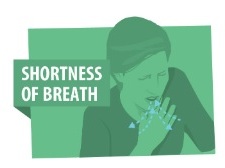Breathlessness
From W8MD weight loss and sleep centers
Breathlessness, also known as shortness of breath or dyspnea, is a subjective sensation of difficulty or discomfort in breathing. It can range from mild to severe and may be accompanied by a feeling of suffocation or tightness in the chest. Breathlessness can occur due to various reasons, both temporary and chronic. In this article, we'll explore the causes of breathlessness, potential underlying conditions, and strategies for managing and alleviating this sensation.
Causes of Breathlessness
- Breathlessness can be caused by a wide range of factors, including:
- Physical Exertion: Engaging in intense physical activity or exercise can lead to temporary breathlessness. This is a normal response as the body requires increased oxygen intake to meet the demand for energy.
- Respiratory Conditions: Various respiratory conditions can cause breathlessness, such as asthma, chronic obstructive pulmonary disease (COPD), pneumonia, or bronchitis. These conditions may result in airway narrowing, inflammation, or reduced lung function.
- Heart Conditions: Certain heart conditions, including heart failure, coronary artery disease, or arrhythmias, can lead to breathlessness. The heart's reduced ability to pump blood effectively can cause fluid buildup in the lungs, resulting in breathlessness.
- Anxiety and Panic Disorders: Psychological factors, such as anxiety or panic disorders, can cause breathlessness. These conditions may lead to rapid or shallow breathing, triggering a sensation of breathlessness.
- Anemia: A low level of red blood cells or hemoglobin in the blood, known as anemia, can cause reduced oxygen-carrying capacity, leading to breathlessness.
- Allergies: Allergic reactions, such as to certain foods, medications, or environmental triggers, can cause breathlessness due to airway constriction or swelling.
- Obesity: Excessive body weight can put extra strain on the respiratory system, leading to breathlessness, especially during physical exertion.
- Other Factors: Other factors that can contribute to breathlessness include high altitude, extreme temperatures, smoking, exposure to pollutants or irritants, certain medications, or underlying health conditions.
Managing Breathlessness
- The management of breathlessness depends on its underlying cause. Here are some strategies that may help alleviate or manage breathlessness:
- Relaxation Techniques: Practice deep breathing exercises, such as diaphragmatic breathing or pursed-lip breathing, to promote relaxation and improve breathing efficiency.
- Positioning: Find a comfortable position that helps ease breathlessness. Some individuals may find sitting upright or leaning forward slightly more comfortable than lying down.
- Pace Yourself: During physical activity, pace yourself and take frequent breaks to avoid overexertion. Gradually increase your activity level under the guidance of a healthcare professional if necessary.
- Address Underlying Conditions: Seek appropriate medical care to diagnose and treat any underlying respiratory or heart conditions contributing to breathlessness. Follow the recommended treatment plan and medication regimen provided by your healthcare provider.
- Manage Anxiety or Panic: If breathlessness is related to anxiety or panic disorders, consider seeking professional help, such as therapy or counseling, to develop coping mechanisms and manage symptoms effectively.
- Weight Management: If obesity is a contributing factor, work towards maintaining a healthy weight through a balanced diet and regular exercise. Consult with a healthcare professional or registered dietitian for personalized guidance.
- Environmental Considerations: Minimize exposure to known triggers, such as allergens, pollutants, or irritants, to reduce the risk of breathlessness. Ensure a clean and well-ventilated living environment.
Also see
This is a short summary article. For quality control, we do not encourage or allow strangers to edit the content.

